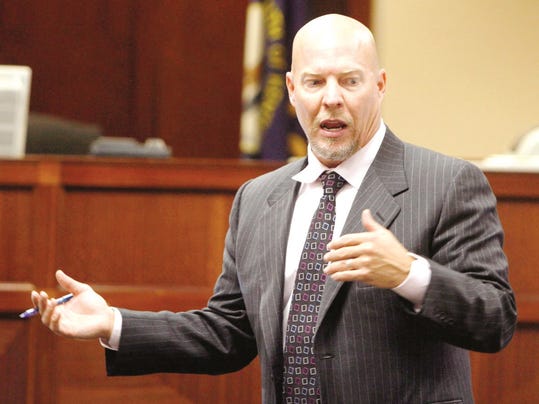KY Primary 2015: Voter resources: Are you ready for Tuesday’s Kentucky Primary? – Story
Voters in the Bluegrass state will head to the polls Tuesday for the 2015 primary elections cycle and decidewhich of the candidates will step into several high-level state offices. The replacement will serve out the rest of his term, which ends in 2020. Tuesday’s primaries follow the emergency passage earlier this month of a new state regulation banning electioneering within 100 feet of polling places.
Kentucky Supreme Court suspends Eric Deters again
 Kentucky’s high court suspended Deters for 60 days, 30 days each for ethical violations in two cases dating back years. That led to a guilty finding against Deters. He was ordered to pay $29,381 to the opposing parties’ attorneys.
Kentucky’s high court suspended Deters for 60 days, 30 days each for ethical violations in two cases dating back years. That led to a guilty finding against Deters. He was ordered to pay $29,381 to the opposing parties’ attorneys.
Sixth Circuit refuses to create a cause of action for reverse bad faith – Lexology
In an opinion handed down last week, the Sixth Circuit Court of Appeals refused to adopt a new cause of action under Kentucky law for a reverse bad faith claim by an insurer against its insured where the Kentucky Supreme Court had not previously done so in State Auto Prop. & Cas. Ins. Co. v. Hargis, — F.3d – (6th Cir., May 6, 2015). The Sixth Circuit further refused to certify the question to the Kentucky Supreme Court for review. Slip Op. at *4-5.
The Evolving Duty of Trustee Communication with Beneficiaries | The National Law Review
Trustee communications with beneficiaries have followed an interesting legal path in Kentucky. The original Kentucky statute regarding communication with the beneficiaries required that the trustee must keep the beneficiaries reasonably informed about trust activities. This statute, KRS 386.715, did not make a distinction between revocable and irrevocable trusts. The traditional presumption is that a settlor may change a revocable trust at will, and thus the trustee of a revocable trust did not have a duty to notify beneficiaries of trust status, as the identity of the beneficiaries could potentially be in flux.
The Kentucky Supreme Court came to the opposite conclusion in the 2009 case of JP Morgan Chase Bank, N.A., v. Longmeyer, however. The court in that case noted it was hamstrung by the lack of an explicit distinction between revocable and irrevocable trusts under Kentucky trust law, stating that the statutory duty of a trustee to inform beneficiaries knows no distinction between the two types of trusts. The court then hinted that it is “the legislature’s task to amend the statutes, not this Court’s role to re-write them.” read more…..
Ky.’s high court vacates student’s drug conviction – WTVQ
 (WTVQ) – Nearly five years ago, three police officers entered a University of Kentucky fraternity and arrested a student for possession and trafficking marijuana.
(WTVQ) – Nearly five years ago, three police officers entered a University of Kentucky fraternity and arrested a student for possession and trafficking marijuana.
On Thursday, Kentucky’s Supreme Court said the officers weren’t allowed in the house in the first place.
It was an unlawful entry, according to the Supreme Court brief published Thursday.
Police never had permission to enter the Delta Tau Delta fraternity near UK’s campus and then search the then sophomore’s room.It was during the 2010 fall semester and detectives were investigating a tip that UK student David Milam was selling marijuana.According to the Supreme Court brief, police went to the fraternity house and went inside a door that officers said was open.
Norton Healthcare lost piece of patient’s brain, suit says
Fred Habermel, 72, said that on July 11, 2014, he underwent surgery at Norton Cancer Institute to extract brain tissue to be used to develop a vaccine that in turn would be injected into his head in an experimental procedure to fight a brain tumor. The suit says Habermel was diagnosed in October 2013 with a glioblastoma brain tumor, which are highly malignant, according to the American Brain Tumor Association. The next month he underwent brain surgery for the first time, to remove a portion of the tumor, and the operation was followed by about 30 rounds of radiation.
But according to the suit, several weeks later a Norton physician, Dr. Ali Choucair, called to tell Habermel and his wife, Dru, they needed to come to his office as quickly as possible.
The suit says he told them Norton “employees, agents or servants” had lost the brain tissue.
That meant Habermel could not receive the experimental treatment, according to the suit, filed May 12 in Jefferson Circuit Court against Norton Hospitals, Norton Healthcare and the cancer institute at 234 E. Gray St.
Although Habermel has survived nearly a year since the surgery, attorney Gary Weiss, who filed the complaint on behalf of Habermel and his wife, said his prognosis is grim.
But there was one silver lining, Weiss said: The hospital told them they wouldn’t have to pay for the second surgery.
